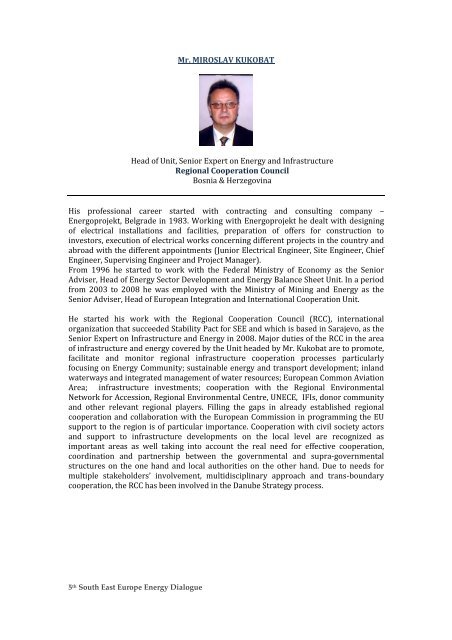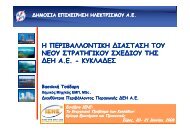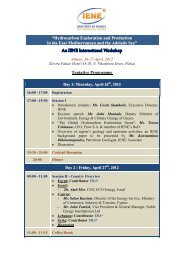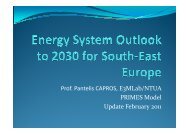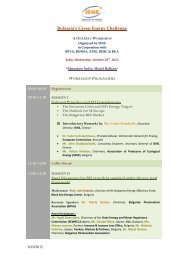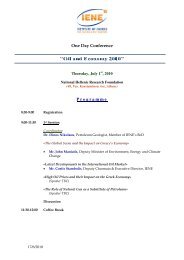S P E A K E R S & P A N E L I S T S C U R R I C U M V I T A E
S P E A K E R S & P A N E L I S T S C U R R I C U M V I T A E
S P E A K E R S & P A N E L I S T S C U R R I C U M V I T A E
- No tags were found...
Create successful ePaper yourself
Turn your PDF publications into a flip-book with our unique Google optimized e-Paper software.
Mr. MIROSLAV KUKOBAT<br />
Head of Unit, Senior Expert on Energy and Infrastructure<br />
Regional Cooperation Council<br />
Bosnia & Herzegovina<br />
His professional career started with contracting and consulting company –<br />
Energoprojekt, Belgrade in 1983. Working with Energoprojekt he dealt with designing<br />
of electrical installations and facilities, preparation of offers for construction to<br />
investors, execution of electrical works concerning different projects in the country and<br />
abroad with the different appointments (Junior Electrical Engineer, Site Engineer, Chief<br />
Engineer, Supervising Engineer and Project Manager).<br />
From 1996 he started to work with the Federal Ministry of Economy as the Senior<br />
Adviser, Head of Energy Sector Development and Energy Balance Sheet Unit. In a period<br />
from 2003 to 2008 he was employed with the Ministry of Mining and Energy as the<br />
Senior Adviser, Head of European Integration and International Cooperation Unit.<br />
He started his work with the Regional Cooperation Council (RCC), international<br />
organization that succeeded Stability Pact for SEE and which is based in Sarajevo, as the<br />
Senior Expert on Infrastructure and Energy in 2008. Major duties of the RCC in the area<br />
of infrastructure and energy covered by the Unit headed by Mr. Kukobat are to promote,<br />
facilitate and monitor regional infrastructure cooperation processes particularly<br />
focusing on Energy Community; sustainable energy and transport development; inland<br />
waterways and integrated management of water resources; European Common Aviation<br />
Area; infrastructure investments; cooperation with the Regional Environmental<br />
Network for Accession, Regional Environmental Centre, UNECE, IFIs, donor community<br />
and other relevant regional players. Filling the gaps in already established regional<br />
cooperation and collaboration with the European Commission in programming the EU<br />
support to the region is of particular importance. Cooperation with civil society actors<br />
and support to infrastructure developments on the local level are recognized as<br />
important areas as well taking into account the real need for effective cooperation,<br />
coordination and partnership between the governmental and supra-governmental<br />
structures on the one hand and local authorities on the other hand. Due to needs for<br />
multiple stakeholders’ involvement, multidisciplinary approach and trans-boundary<br />
cooperation, the RCC has been involved in the Danube Strategy process.<br />
5 th South East Europe Energy Dialogue


